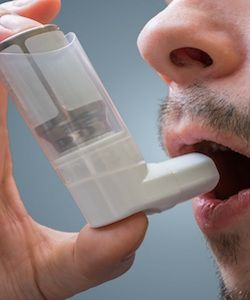Article
Modified Patient Education Programs Do Not Improve Asthma Control
Author(s):
Patient education programs show no noticeable effect on actual asthma control.

Patient education programs have been found to be beneficial for management of asthma in adult patients, but showed no noticeable effect on actual asthma control.
Researchers at the University of Education in Freiburg, Germany, and the Rehabilitation center Utersum in Föhr, Germany, analyzed current patient education programs for patients with asthma and discovered that the adoption of a patient-centered, standardized program for patient education did not have a noticeable effect on asthma control.
It did, however, increase self-management knowledge for patients in a shorter amount of time in comparison to traditional lecture-style asthma education programs.
Kathrin Bäuerle, MA, with the Department of Everyday Culture, Exercise and Health at the University of Education in Freiburg, and her fellow researchers set out to evaluate the effectiveness and efficiency of a modified patient-centered, standardized patient education program in terms of its ability to help adult patients with asthma increase their asthma control, explaining, “patient education is a key component of the medical rehabilitation of patients with chronic diseases and plays a substantial role in modern disease management.”
The study also claims that many patient education programs lack certain “quality requirements, such as the use of manuals and theory-based techniques,” and that healthcare providers working with patients with asthma may need more standardized instructions, clearer and more structured lessons, and more resources for motivated patient-centered, rather than teacher-centered, education.
The researchers modified classic health education curriculums with a constructivist approach that allows for more patient involvement in the education process. This approach centers on an interactive teaching style which takes into account student background, experience, and learning style.
Instructors, using this approach to teaching, serve as facilitators as patients work through learning sequences centered on problem-oriented situations and examples. This sort of active learning, the study suggests, “engages learners in more intensive thinking processes” and activities than traditional lecture-based instruction.
Bäuerle and colleagues theorized that incorporating a modified patient education program (MPEP) with the traditional lecture-based programs for patients with asthma would provide patients with demonstrable tools to improve their asthma control.
The study determined that asthma control in participating patients was unaffected by the MPEP overall, but that there were improvements to their ability to self-manage symptoms.
The single-center controlled trial of patients with asthma took place in an inpatient medical rehabilitation center between April and November of 2013.
The 214 control patients received standard lecture-based asthma education. The 209 patients participating in the MPEP were recruited from the same inpatient medical rehabilitation center between April and November of the following year, and assessment data was collected during four points: admission, discharge, and at 6- and 12-month follow-ups.
According to the researchers, the “duration of inpatient rehabilitation is 3 weeks on average” and is conducted by a multidisciplinary healthcare team including not only medical treatment, but health education, physical training, and psychological support/counseling.
The study focused on the health education aspect of rehabilitation using the MPEP (or control) to instruct patients with asthma in self-management of the disease. The MPEP’s 7 modules and introductory session totaled 675 minutes of education focusing on basic asthma knowledge to medication adherence to asthma exacerbation action plans.
Bäuerle states that an important aspect of all sessions was the “reference to everyday life, the active involvement of the patients (for example, by preparing homework), and actually practicing the concrete actions set forth by the lesson plans.”
The study’s analysis of data to measure asthma control concluded that there was no statistically significant difference between control outcomes, asthma knowledge, health-related quality of life, or hospitalization between patients participating in the traditional education program versus the MPEP education program.
However, Bäuerle and colleagues agreed that because of the reduction in time spent in health education programs (735 minutes for traditional programs/675 minutes for MPEP) and the MPEP’s appropriateness for adult education, the MPEP should be considered for use in rehabilitation settings.
The group suggests that future studies on asthma education are needed because of the role such education plays in disease management.
The article “Evaluation of a Standardized Patient Education Program for Inpatient Asthma Rehabilitation: Impact on Patient-reported Health Outcomes up to One Year” was published in the May 2017 issue of Patient Education and Counseling.
Related Coverage
Educating Parents Is Key to Improving Kids' Asthma
Hospital Admission an Opportunity to Evaluate, Educate about Asthma's Comorbidity Potential
Technology Tweaks Asthma Self-Management Programs for Adolescents


